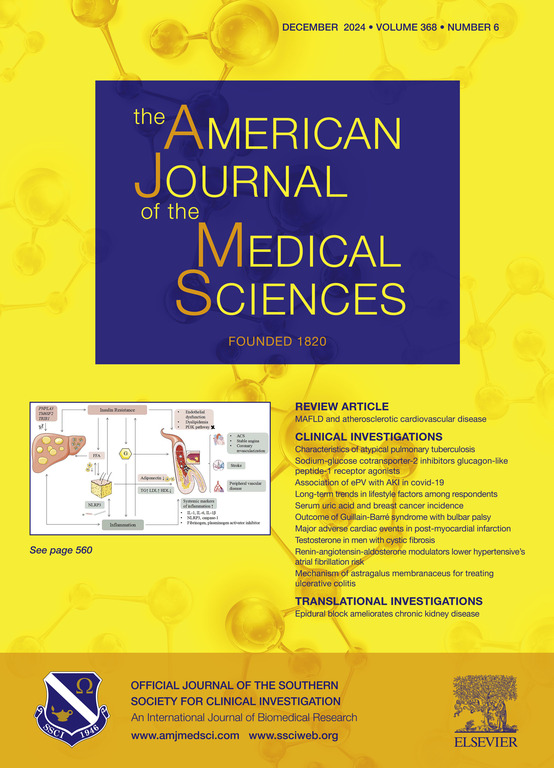Gut barrier dysfunction, endotoxemia and inflammatory response in STEMI patients and effect of primary PCI
IF 1.8
4区 医学
Q2 MEDICINE, GENERAL & INTERNAL
引用次数: 0
Abstract
Background
Gut-derived bacterial and endotoxin translocation induce systemic inflammation, which exerts a pivotal pathogenetic role in all phases of atherosclerosis.
Objectives
To investigate prospectively the gut barrier function, endotoxin translocation and inflammatory response in ST-elevation myocardial infarction (STEMI) patients undergoing primary percutaneous coronary artery intervention (PPCI).
Methods
Twenty-seven patients with STEMI that underwent successful PPCI were subjected to peripheral blood sampling at 3-time points; before PPCI (day0), 24 h (day1) and 96 h (day4) after PPCI and were compared with 20 chronic coronary syndrome (CCS) patients and 11 healthy controls. Serum ZO-1, I-FABP and endotoxin concentrations were determined by ELISA. Concentrations of cytokines IL-1β, -6, -8, -10 and TNF-α were determined by flow cytometry.
Results
Patients with STEMI before PPCI (day0) had increased serum ZO-1 and endotoxin, both at significantly higher levels compared to CCS patients. STEMI induced also significant increases of the cytokines IL-6, -8 and -10. After PPCI, a significant improvement of gut barrier integrity (ZO-1) and endotoxemia was observed from the first day. At day4 post PPCI, systemic endotoxin and cytokines IL-6, -8 and -10 levels were reduced to control levels. Serum ZO-1 levels were positively correlated with systemic IL-10 concentrations (r = 0.471).
Conclusion
STEMI is associated with gut barrier dysfunction, systemic endotoxemia and inflammatory response, which improve rapidly following successful PPCI.
STEMI 患者肠道屏障功能障碍、内毒素血症和炎症反应以及初级 PCI 的影响。
背景:源于肠道的细菌和内毒素转运诱发全身炎症:肠道细菌和内毒素转运会诱发全身炎症,而炎症在动脉粥样硬化的各个阶段都起着关键的致病作用:目的:对接受经皮冠状动脉介入治疗(PPCI)的ST段抬高型心肌梗死(STEMI)患者的肠道屏障功能、内毒素转运和炎症反应进行前瞻性研究:对成功接受经皮冠状动脉介入治疗的 27 例 STEMI 患者在三个时间点(经皮冠状动脉介入治疗前(第 0 天)、经皮冠状动脉介入治疗后 24 小时(第 1 天)和经皮冠状动脉介入治疗后 96 小时(第 4 天))进行外周血采样,并与 20 例慢性冠状动脉综合征(CCS)患者和 11 例健康对照组进行比较。血清 ZO-1、I-FABP 和内毒素浓度由 ELISA 法测定。通过流式细胞术测定细胞因子 IL-1β、-6、-8、-10 和 TNF-α 的浓度:结果:PPCI 前(第 0 天)STEMI 患者的血清 ZO-1 和内毒素水平均显著高于 CCS 患者。STEMI 还导致细胞因子 IL-6、-8 和 -10 显著增加。做完冠状动脉造影术后,肠道屏障完整性(ZO-1)和内毒素血症从第一天起就得到了明显改善。在实施 PPCI 后的第 4 天,全身内毒素和细胞因子 IL-6、-8 和 -10 水平已降至对照组水平。血清 ZO-1 水平与全身 IL-10 浓度呈正相关(r=0.471)。在 STEMI 患者中,PPCI 前(第 0 天)的血清内毒素浓度与出院时的射血分数(EF)呈负相关:结论:STEMI 与肠道屏障功能障碍、全身内毒素血症和炎症反应有关,这些症状在成功进行心肺复苏术后会迅速改善。
本文章由计算机程序翻译,如有差异,请以英文原文为准。
求助全文
约1分钟内获得全文
求助全文
来源期刊
CiteScore
4.40
自引率
0.00%
发文量
303
审稿时长
1.5 months
期刊介绍:
The American Journal of The Medical Sciences (AJMS), founded in 1820, is the 2nd oldest medical journal in the United States. The AJMS is the official journal of the Southern Society for Clinical Investigation (SSCI). The SSCI is dedicated to the advancement of medical research and the exchange of knowledge, information and ideas. Its members are committed to mentoring future generations of medical investigators and promoting careers in academic medicine. The AJMS publishes, on a monthly basis, peer-reviewed articles in the field of internal medicine and its subspecialties, which include:
Original clinical and basic science investigations
Review articles
Online Images in the Medical Sciences
Special Features Include:
Patient-Centered Focused Reviews
History of Medicine
The Science of Medical Education.

 求助内容:
求助内容: 应助结果提醒方式:
应助结果提醒方式:


